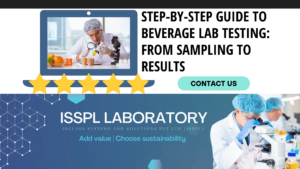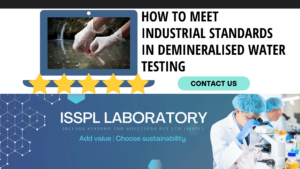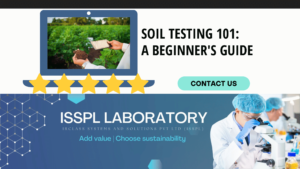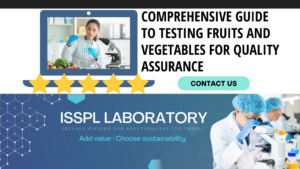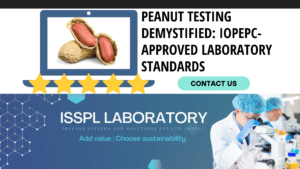An Overview by Team ISSPL - Analytical Testing Laboratory in India
ToggleFood testing is an integral sector and a significant service in the food and agriculture industry. It has a substantial role in the efficient manufacturing of non-toxic, valuable, and quality edible products. In the current times, the food industry necessitates thorough inspection and in-depth testing for the production of premium quality edible products. It is also critical to safeguard public health by avoiding possible risks. As contamination in food gets unavoidable in the food industry for the circumstances and poor infrastructure, the food testing requirement has emerged as the ultimate combating tool.
- Food quality and testing – The quality of food has always been an influential factor in the industry and the trade transactions of food products. In recent times, the need for quality control has gained more importance for food safety issues. The critical and strict regulations have intensified the quality control requirements to meet international trade concerns and norms. The trade and transaction of edible products are crossing geographical boundaries, and thus with rapid globalization, the food quality factor is emerging as a crucial determinator for trade in domestic and international markets. The food quality and standards help in capturing the buyer’s attention. Apart from this, the regulatory bodies can also improve the monitoring of potential threats.
About the process – Food testing at a glance
Food product testing is an important step. Even though it is a conclusive step in the food production and manufacturing chain, the testing process is necessary. One needs to assure that the manufactured product is free of any physical, chemical, toxic, or biological hazards. It also ensures the safety of the food for consumption and utility.
The most common examples of potentially perilous impurities in food include the following –
- Metals
- Pathogens
- Cleaning agents
- Chemical additives and preservatives
- Pesticides and adulterants, etc.
Food product testing is the scientific analysis of food and its components used for manufacturing. The lab testing result delivers critical and accurate information about diverse food characteristics like – structure, texture, composition, physical and chemical properties, etc.
- The food strip testing technique – Food testing gets conducted in the laboratories, under expert supervision. For a quicker result and testing facility, one can also find food testing strips. The specialized strips help determine if the food contains toxic elements or bacteria responsible for developing foodborne diseases. These testing strips can be used on hard edible products and liquids. Many people select such quick testing facilities to secure an efficient solution at home and factory.
10 Reasons that make food testing crucial
Food testing is vital for the food industries for multiple reasons and concentrates on a wide range of production and trade requirements –
- Testing the quality of an edible product – For ensuring optimal consumption safety.
- Quality control measure – For ensuring the best manufacturing assurance.
- Food inspection and rating – For meeting domestic and global standards.
- Food authenticity inspection – Crucial for ensuring food trade standards.
- Testing for ingredients – In-depth idea about the ingredient quality and safety.
- Nutritional information – Ensures improved marketing and trading.
- Food nutrition analysis – A systematic approach for food trade and global marketing
- Shelf-life analysis – For making practical trade decisions in the long run
- Sensory analysis – An in-depth study of the food texture, structure, flavor, smell, etc.
- Informed purchase – A transparent trade policy for enhancing customer awareness
Different ways to test the food and the purpose
Food product testing can get conducted by following several methods. The testing methods are new-age and technically advanced. Thus, one can obtain precise and authentic information on nutritional quality and food safety. Both manufacturers and consumers can inspect the sample of the edible product. The frequently used methods of food testing in the laboratories include the following:
- Analytical chemistry testing: The analytical evaluation helps identity, classify and recognize the quantity of the critical chemical components in the food product. It could be organic or inorganic components like – pH, chemical additives, nutrients, chemical and food preservatives, minerals, etc.
- Microbiology inspection: The laboratory testing under expert microbiologists helps the food manufacturing agents and production team identify the microorganisms in the food. It helps them recognize the safety status of the raw materials in the production steps, ingredients, and final food products. Microbiological testing also helps in reviewing the decaying pathogens and prevents the chances of food poisoning caused by the manufacturing ingredients.
In-depth and systematic testing is vital for ensuring an efficient production and supply chain from an economic point of view. Why? Because one can avoid the heft production of contaminated food product batches at the primitive stage and avoid making heavy losses.
- Food allergen test: The food allergen components are proteins that may be present in vast quantities. The purpose of conducting the test is to recognize the prime allergen component in the manufacturing ingredients and end product. Usually, the allergen inspection process is common for checking gluten in grains, peanuts, eggs, nuts, dairy, etc.
- Nutritional evaluation: The nutritional evaluation step in food testing delivers precise data on the nutritional content of edible products. The evaluation result helps the manufacturers analyze the details and ensures a transparent information exchange through food packaging. It is critical for customer awareness and reflects the adherence to food safety compliances and labeling criteria.
Benefits of the test in India
Food inspection and analysis need to be performed consistently for food safety. The manufacturers can adhere to the norms and regulations in India. Even for the packaged food, the makers must provide the FSSAI label.
- It helps the manufacturers to improve and regularize their food quality.
- It guarantees a healthy and consistent supply of premium-quality food at reasonable rates.
- Manufacturers can avoid controversies and offer transparent trading exemplary for improved customer relationships.
- The food safety and testing results assure the customer and enhance brand reliability to the next level.
ISSPL Laboratory – Simplifying the needs across industries
ISSPL laboratory is among the top choices in the agriculture and food testing sector in India. Get the world-class infrastructure for food testing at the labs. Each testing laboratory is equipped with state-of-the-art analytical equipment pieces and experts. The techniques followed at the lab conform to accuracy for physical, chemical, or microbiological testing of food.

